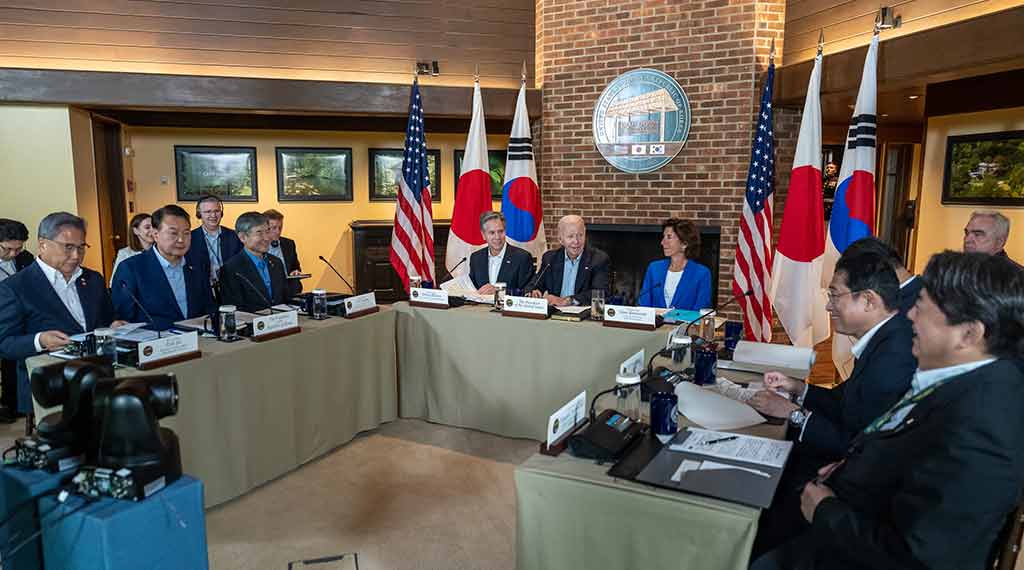‘2+2’ security talks: Is Japan almost cured of its nuclear allergy?

United States Secretary of State Antony Blinken and Defense Secretary Lloyd Austin included an “extended deterrence dialogue” (EDD). They they met their Japanese counterparts Foreign Minister Yoko Kamikawa and Defense Minister Minoru Kihara in Tokyo on July 28 for their 2+2 US-Japan Security Consultative Committee talks.
The Japanese and Americans have held EDD talks since 2010, but never at this level.
Simply put, “extended deterrence” refers to nuclear weapons. It includes America potentially using its nuclear arsenal to defend Japan, which has no nukes of its own.
Japan was keen to hold this high-level discussion. It wanted to be sure of America’s “nuclear umbrella” – not least to avoid nuclear blackmail and deter attack from its nearby adversaries, China, North Korea, and even Russia.
The late Prime Minister Shinzo Abe was a leading, even outspoken, proponent of American nuclear coverage. Indeed, he even suggested he wouldn’t mind if the US stored nukes in Japan.
The Americans prefer Tokyo settle for a “trust us” approach but know that won’t happen.
Japan wants specifics and assurances. Outright guarantees would be even better.
Military Buildup of China and North Korea
China has carried out a massive military buildup over the last 30 years. Given this, the conventional balance of power in East Asia is troubling enough for Japan. Add in nukes and it’s even worse.
China has the nuclear weapons to blanket Japan at least several times over. And it has suggested it just might. As well, North Korea has dozens of nuclear weapons.
Not surprisingly, Japan is edgy.
The Americans need to assuage Japanese concerns. This requires specifics – and not oratory and reassurances of “ironclad” commitment. More than anything, the US needs to convince Tokyo it has the will to act.
Whether Secretaries Blinken and Austin succeeded is an open question, at best.
Japanese Paradox
There’s something paradoxical about all this.
Japan is supposedly a pacifist country. If so, it has always been a strange sort of pacifism. Japan has a sizable military – even if it’s called a self-defense force.
And pacifist Japan has always been happy to have the American forces standing by to exterminate anyone threatening the country.
That’s pacifism with a difference.
But when it comes to nuclear weapons the paradox is even more…well…paradoxical.
Japan is the only country to have been attacked with atomic bombs, twice in 1945 in the latter stages of World War II.
It has pushed for nuclear non-proliferation for decades and still does.
But one senses the Japanese nuclear allergy is in part genuine and in part psychosomatic. It is all enabled by the promise of US nukes being available. Moreover, for a long time, Japan believed it would never face a threat that required them.
Japan’s aversion to nuclear weapons perhaps has less to do with the weapons themselves, and more to do with the catastrophe Japan suffered during World War II. Additionally, the 1941-1945 war was only a follow-on to a costly, bloody quagmire in China starting in 1931.
- China, Look at the Numbers: Japan Threatens Nobody - December 8, 2025
- Newsham Breaks Down Latest China–Japan Standoff Near Senkakus Islands - December 4, 2025
- China’s Act of War Against PM Takaichi and Japan - November 24, 2025
